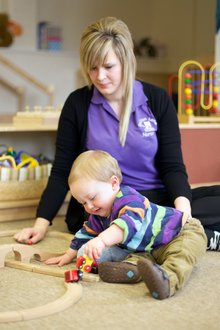One of the greatest gifts that we can give our children is self-confidence. A strong sense of self-belief will stand your child in good stead throughout their lives, helping them to be successful, happy and sociable. We don’t fully understand why some people have stronger self-esteem than others, but you can help your child build a strong foundation of confidence with some simple steps to boost their developing view of who they are and what they can do.
Don’t come to their rescue
It can be very tempting to leap to help your child out whenever they're finding something difficult; no one likes to see their little one struggling. But jumping in before he or she asks for help can send the message that you don’t believe your child can do it by themselves and prevents them from learning new skills. Learning through trial and error, and understanding that if something doesn’t go perfectly first time it’s not the end of the world, are valuable life skills. Do your best to hide your own anxieties about how they're coping by keeping a smile on your face and radiating confidence in their abilities!
Let them make decisions – within reason!
Offering a very young child too many choices can be overwhelming, but letting them make some decisions will help him or her feel that you have confidence in their judgement. Though you might not want to give your child full control by asking ‘what would you like to do today?’, for example, you could give them the choice between a trip to the park or swimming.
Plan for the future
Talking to your child about what or who they could be in the future encourages them to plan ahead and be ambitious. There’s nothing wrong with fantasising about being Dora the Explorer, or an astronaut: dreaming big is one of the luxuries of childhood and should be encouraged! And remember – children don’t really understand modesty, or playing down their achievements, as adults are encouraged to do. Talking about how great he is at something – ‘mummy, I’m the fastest runner in the world EVER!' – might sound like boasting to adult ears, but children should be encouraged to focus on feeling good about themselves and what they can do.
Nurture talents and provide opportunities
You have no idea at this early stage of your child’s life what her talents and enthusiasms will be, and filling her schedule with planned activities can be tiring and stressful. But there are lots of simple ways that you can offer opportunities to find out what she likes and to encourage her to give things a go. Keeping art and craft materials – even if it’s just paper and crayons – within easy reach, teaching her songs and rhymes to sing together, playing simple games of kicking or throwing balls, and letting her get involved with cooking and baking are all good ways to help your child develop a rounded sense of self.
Play with your child
Playing games your little one gives them the message that you think they're fun to be with and someone worth your time and attention. During your play sessions, try to be completely focused on your child, and really listen to what they're saying – it’s hard to set aside time when you’re not distracted by work or phonecalls and texts, but giving your child your full attention will help them feel loved and valued.
Acknowledge your child’s fears
If your child has worries or anxieties, try not to dismiss them. Our natural instinct might be to say things like ‘don’t be silly, there’s nothing to worry about,’ but it's better to acknowledge that life is scary sometimes but you feel sure your child can overcome their worries. Saying something like 'I get worried too sometimes when I have to do something new for the first time,’ helps your child to understand that some anxiety is normal, and that they're not foolish for being worried. You can then help your child focus on ways to overcome their worries, and remind them how proud they will be of themselves afterwards – and how proud you will be too!
Model confident behaviour
Remember that you are your child’s main role model, so do your best to demonstrate what it is to be a confident, happy person, even if you don’t always feel it. Try to silence any critical thoughts you might have about your own appearance or abilities, be friendly and approachable with new people, and try to show resilience – the ability to pick yourself up and dust yourself off – when things go wrong. All this will help your child learn how to make their way through the world with confidence.
Written for the Early Years Alliance by Siobhan Godwood









